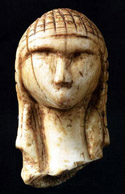Anthropology, Department of

Department of Anthropology: Faculty Publications
Document Type
Article
Date of this Version
January 2000
Abstract
Birth order has been examined over a wide variety of dimensions in the context of modern populations. A consistent message has been that it is better to be born first. The analysis of birth order in this paper is different in several ways from other investigations into birth order effects. First, we examine the effect of birth order in an egalitarian, small-scale, kin-based society, which has not been done before. Second, we use a different outcome measure, fertility, rather than outcome measures of social, psychological, or economic success. We find, third, that being born late in an egalitarian, technologically simple society rather than being born early has a positive outcome on fertility, and fourth, that number of older siblings and sibling set size are even stronger predictors of fertility, especially for males.


Comments
Published in Human Nature 11:2 (2000), pp. 117–156. Copyright © 2000 by Walter de Gruyter, Inc./Springer Verlag. Used by permission.